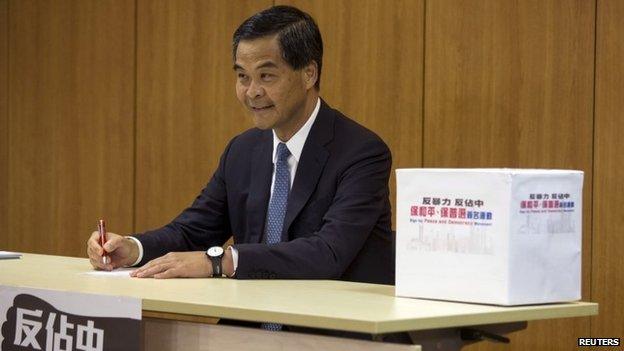Profile: CY Leung, Hong Kong's third chief executive
- Published

CY Leung has been targeted by protesters in Hong Kong, calling for him to step down
The pro-democracy street protests in Hong Kong have given Chief Executive CY Leung his sternest test. Angered by the use of tear gas and batons by police, protesters have demanded his resignation.
For two months last year demonstrators occupied major parts of the city and caused political upheaval.
Even though the government was able to put an end to the Occupy movement, there are still those in Hong Kong who have vowed to continue the struggle for direct voting rights.
Being the man at the helm when China finally issued its ruling on exactly how Hong Kong should elect future leaders was never going to be easy. Supporters of the embattled leader say he is an able politician and should resist calls to step down.
But throughout his tenure, his opponents have accused him of being too close to the mainland leadership. Even though he has tried to implement policies likely to prove popular with Hong Kong's public, critics argue his true loyalties lie with Beijing.
Elected chief executive in March 2012 by a committee of 1,200 people, Leung Chun-ying proved an unpopular choice among the Hong Kong public from the outset.
The front runner had been Henry Tang, the son of a Hong Kong textile baron, until a scandal over an illegal basement he built derailed his campaign.
China's electoral committee gave Mr Leung a majority of 689 votes to Mr Tang's 285, earning him the nickname "689" amongst his critics. Nevertheless his opponent's 285 votes were unexpected, weakening Mr Leung's position from the outset.
Things worsened just before his inauguration, when it emerged that in spite of his loud criticism of Mr Tang's basement, the chief executive-elect had carried out six illegal modifications of his own home.

CY Leung signed a petition opposing the Occupy Central campaign a month before protests broke out
To his supporters though, Mr Leung - born in 1954 to a police officer father - remains a working-class hero.
Winning a scholarship to the prestigious King's College secondary school, he went on to study at Hong Kong Polytechnic and Bristol Polytechnic, working part-time in a Bristol restaurant to fund his studies there.
Carrying his student briefcase which he uses to this day, he returned to Hong Kong and scaled the business ladder, eventually becoming Asia Pacific Chairman of DTZ and earning the nickname "emperor of the working class".
Once elected, he declared his goal to be "chief executive for the people" and instigated two popular policies - a tax on foreigners buying property and a ban on pregnant woman travelling from the mainland to give birth in Hong Kong's already overcrowded hospitals.

Though his goal is to focus on the people, many are angry that CY Leung hasn't listened to their demands for direct voting rights
In 1988, aged just 34, Mr Leung was made head of China's Basic Law Consultative Committee, tasked with helping draft Hong Kong's new constitution.
His critics questioned how someone of his age and supposedly without party membership could gain such a role.
In 2010, some were disturbed when Mr Leung said that China's former Premier, Deng Xiaoping, should have been the first Chinese Nobel Peace Prize winner, not political prisoner Liu Xiaobo.
Upon his election, there was more concern when Chinese newspaper the People's Daily referred to him as "comrade".
And decisions such as one in 2012 to implement pro-China "patriotic lessons" in schools - which was later vetoed - have cost him dearly in terms of public support.